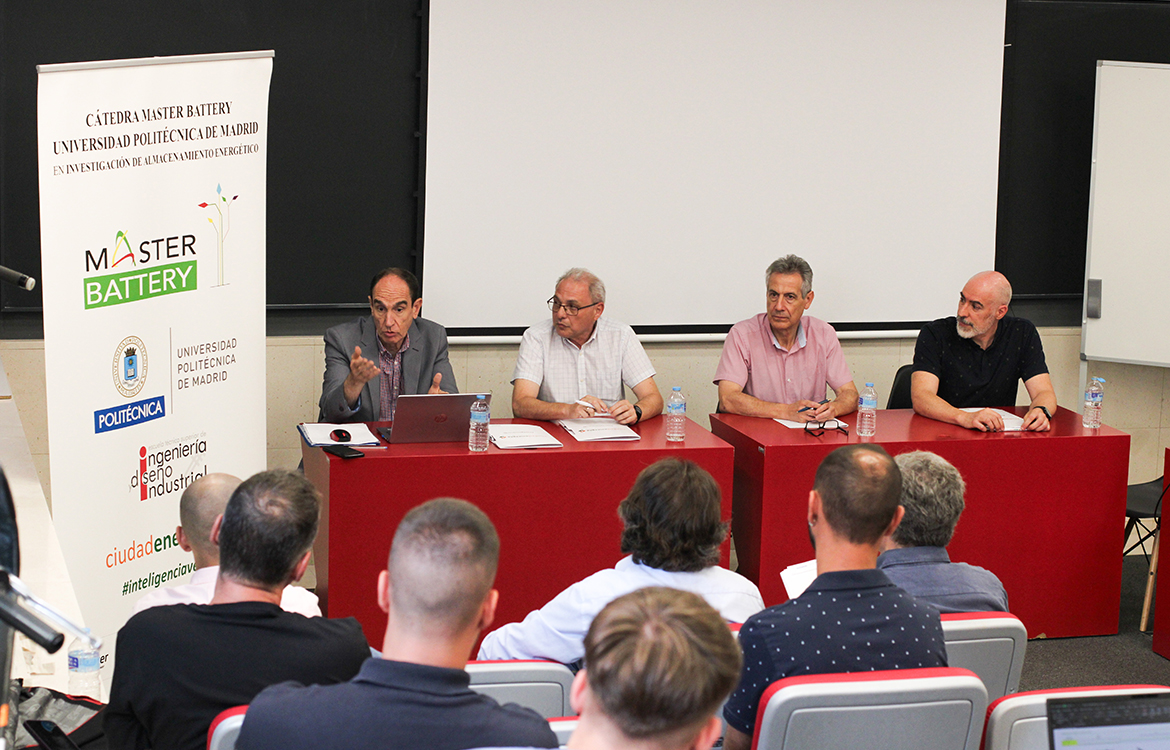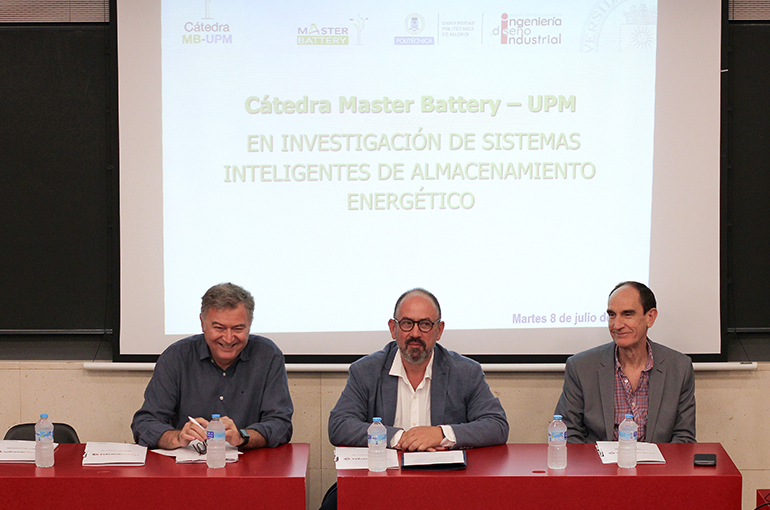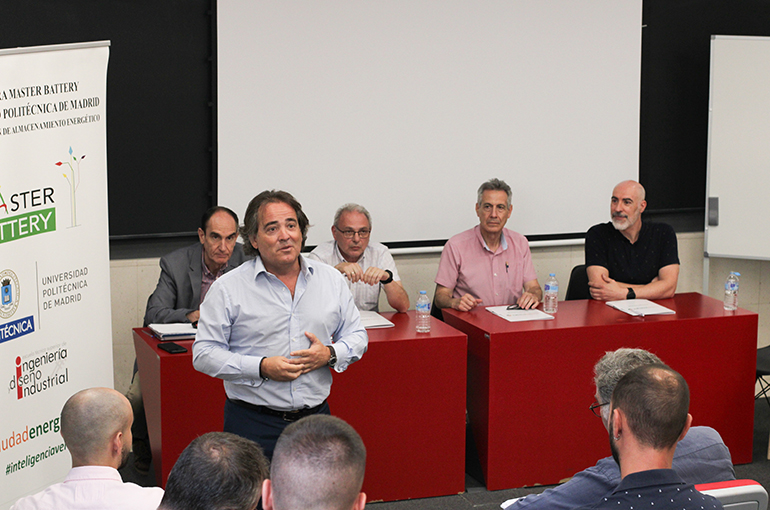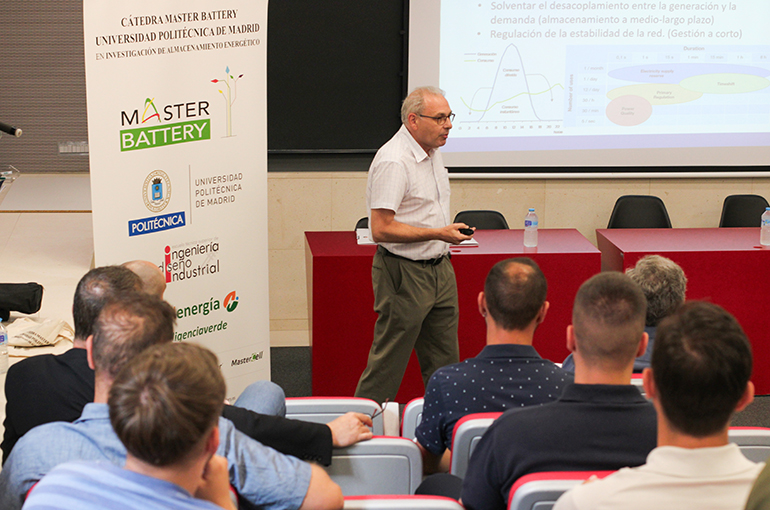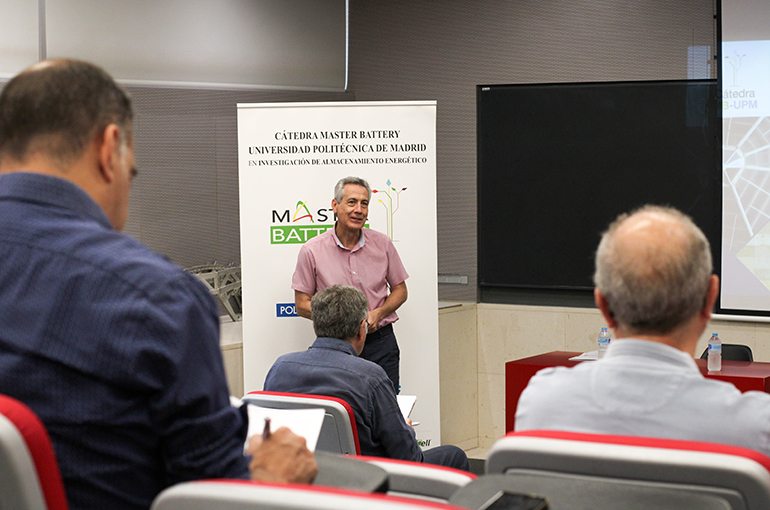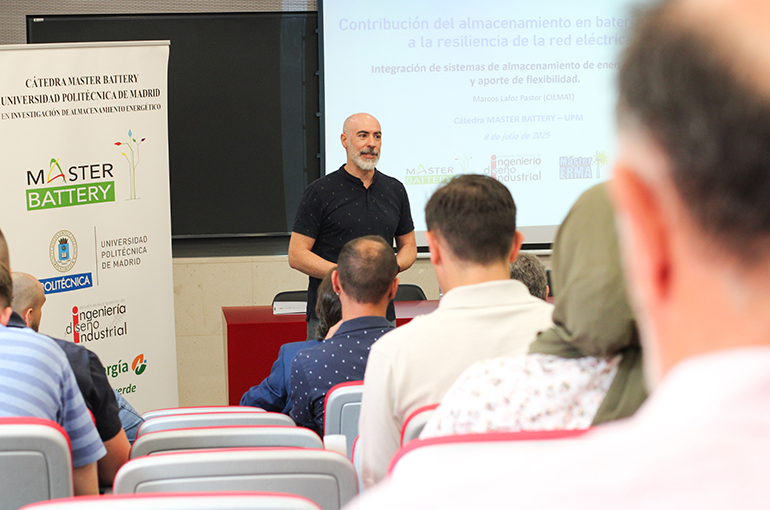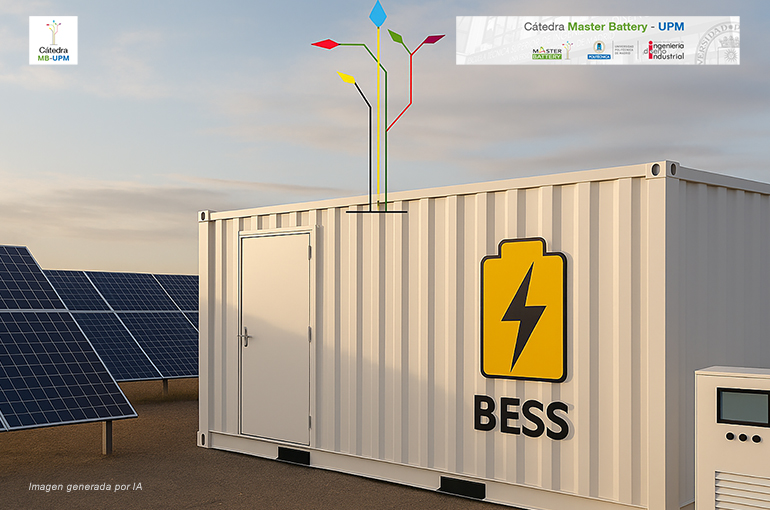The Master Battery-UPM Chair holds its first technical conference on the role of BESS storage in the flexibility and resilience of the electricity grid
- Experts from the Polytechnic University of Madrid, IMDEA Energía and CIEMAT explain the characteristics of BESS storage and its contribution to the flexibility and resilience of the electricity grid.
- The conference was held at the ETSIDI and its director, Francisco Santos, underlined the importance of the Chair for learning and promoting research in energy storage.
- Juan Carlos Hernández, CEO of Master Battery, highlighted that this conference was an excellent opportunity to learn about the key role of BESS systems in the energy transition and to highlight the value of the collaboration with the Universidad Politécnica de Madrid.
Madrid (Spain), 09.07.25 – The Master Battery Chair - Universidad Politécnica de Madrid, dedicated to research in intelligent energy storage systems, held its first technical conference on 8 July 2025 under the title: ‘Contribution of BESS battery storage to the flexibility and resilience of the electricity grid’. The conference brought together researchers, teachers and professionals from the energy sector to discuss the challenges and opportunities of BESS storage.
This conference comes at a key moment, when the causes and consequences of the recent Iberian blackout, which has highlighted the vulnerability of electricity systems to extreme events, are still being analysed. In this context, the conference aimed to focus on the role of battery storage systems as a possible essential tool to reinforce the resilience and flexibility of the grid, and to move towards a safe, efficient and sustainable energy transition.
One of the main objectives of the conference was to disseminate technical knowledge on BESS systems and their evolution, with special attention to their architecture, useful life and strategic role. Aspects related to the integration of these systems into the electricity grid, the most appropriate operating models and their contribution to system stability in a context of increasing renewable generation were also addressed.
The meeting took place at the School of Engineering and Industrial Design (ETSIDI) of the UPM. The institutional opening was in charge of its director, Francisco Santos, who underlined the importance of the Master Battery - UPM Chair and of this conference for technical training and the promotion of applied research in energy storage.
Structure of the 1st Master Battery - UPM Chair Conference
The Chair's director, Julio Amador Guerra, professor at the ETSIDI, opened the round of presentations by explaining the objectives of the event, introducing the participants and reviewing the Chair's trajectory and its main lines of work.
Alberto Abanades, Professor of Energy Engineering at the UPM, focused his speech on explaining why storage is key to the energy transition, stressing that ‘it is the only way to match intermittent and variable generation with a demand determined by the activity of society’. According to Abanades, ‘storage systems are diverse and offer different advantages that allow them to be integrated into the complex energy system, adapting to factors such as the seasonality of the resource, industrial needs, the type of primary source or the control and response requirements of the grid’.
Jesús Palma, senior researcher and head of the Electrochemical Processes Unit at IMDEA Energía, gave a detailed overview of the architecture and lifetime of battery-based storage systems. Palma stressed that ‘the performance of BESS systems is directly conditioned by the behaviour of the batteries, whose degradation depends on factors such as operating conditions and the passage of time, even when they are not in use’.
In this regard, he explained that when a significant loss of capacity is reached, batteries must be assessed to decide whether they can be reused or should be sent for recycling. He recalled that the recycling of their materials is mandatory in the European Union, although their profitability may vary depending on the value of the components recovered.
Marcos Lafoz, CIEMAT researcher, focused his speech on the integration of BESS systems into the electricity grid and their role in improving flexibility. He described the main components that make up these systems, highlighting the electronic power converter as an essential element for their connection and integration. He analysed the different possible configurations and explained the grid-following and grid-forming operating modes, differentiating their functions within the electricity system. He also explained the benefits that these schemes can provide to the grid -such as frequency support or voltage stabilisation- and presented a methodology for the optimal sizing of these systems in renewable installations.
The conference concluded with a round table focused on the contribution of storage to the flexibility and resilience of the electricity grid. The wide range of services that BESS systems can offer was highlighted, such as peak demand management, frequency support or improved system control, as well as the need to develop advanced control strategies for their efficient operation.
The round table addressed the need to establish appropriate remuneration and regulation schemes to enable their viable integration into electricity markets. Coordination with renewable generation, technological adaptation, system security, the most profitable usage models and the competitiveness of the European industry were other aspects analysed.
The round table ended with an open reflection: why is Spain, a powerhouse in renewable generation, not yet a powerhouse in energy storage?
Juan Carlos Hernández, CEO of Master Battery, thanked the UPM, the ETSIDI and all the attendees for their participation in the conference. He stressed that this first technical event has been an excellent opportunity to highlight the importance of BESS systems in the energy transition and highlighted the role of the Chair as an example of university-business collaboration.
He also announced the project to build a new battery factory at Master Battery's facilities in Móstoles, which will be integrated with the Logistics and R&D&I departments. This initiative, he said, represents a strategic step for the industrial fabric of the Community of Madrid and an objective that they hope to continue to share with the Polytechnic University of Madrid.
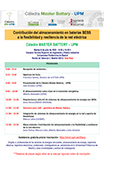 |
Through this link you can access to the information and programme of the conference |
Speakers I Master Battery - UPM Chair Conference
Julio Amador Guerra is director of the Master Battery - UPM Chair and E.U. professor at the School of Industrial Engineering and Design (ETSIDI-UPM). A specialist in electrical grids, renewable energies and photovoltaic systems, he has been directing the Master in Renewable Energies and Environment (ERMA) since 2006. His research activity focuses on the energy analysis of photovoltaic systems and the integration of renewable energies through geographic information systems, participating in numerous projects in Spain and Latin America.
Alberto Abanades is Professor of Energy Engineering at the Polytechnic University of Madrid (UPM) and currently heads the Department of Energy Engineering at the School of Industrial Engineering. A specialist in energy storage and hydrogen, he leads the Thermal Energy for Sustainability research group and is a member of the academic committee of the Master Battery - UPM Chair.
Jesús Palma is a senior researcher and head of the Electrochemical Processes Unit at IMDEA Energía. A specialist in flow batteries, supercapacitors and electrochemical technologies applied to energy storage, he collaborates as a lecturer in master's programmes related to energy and sustainability, such as the ERMA Master's Degree, taught at ETSIDI-UPM. He currently holds the position of vice-president of BatteryPlat, the Spanish battery technology platform.
Marcos Lafoz Pastor holds a PhD in Industrial Engineering from the Polytechnic University of Madrid (UPM) and is a scientific researcher at CIEMAT, where he heads the Electric Drives Unit. A specialist in the integration of renewable energy and BESS storage systems, he has a solid track record in projects related to electricity grids and energy storage.
About the Master Battery Chair - UPM
The Master Battery - UPM Chair was established on 13 September 2024 with the aim of promoting research, training and technology transfer in intelligent energy storage systems. It is based at the ETSIDI, School of Engineering and Industrial Design.
Its main activities include:
- The cession of batteries and equipment by Master Battery to ETSIDI for practices, laboratories and research projects.
- The organisation of workshops, seminars and conferences, with this first technical edition in July 2025.
- The announcement of prizes for the Best Master's Degree Final Projects in energy storage technologies, worth €1,000 each
- Support for training and dissemination initiatives, such as activities with NGOs (e.g. course on solar photovoltaic installations in collaboration with Cesal, UNICEF and Iberdrola). .
This Chair is an outstanding example of university-industry collaboration, aimed at scientific and technological progress and the training of professionals in the field of energy storage.
